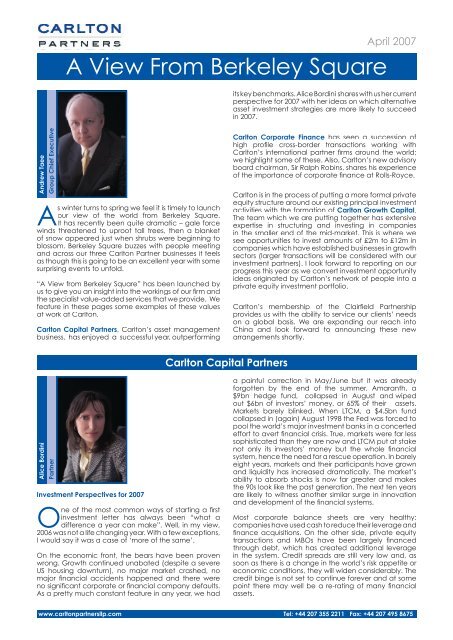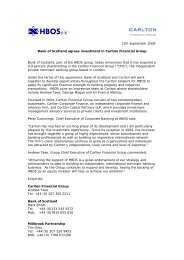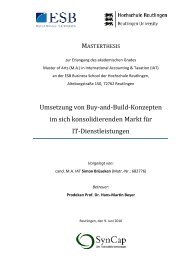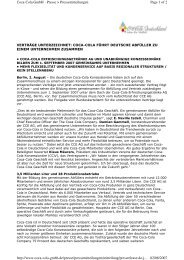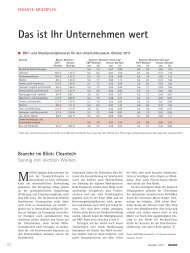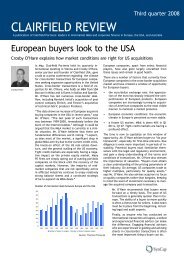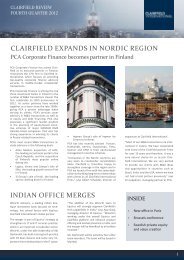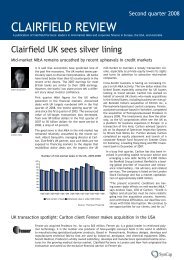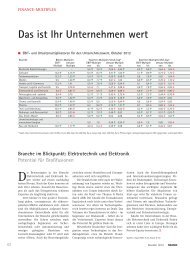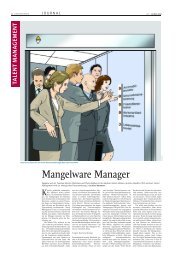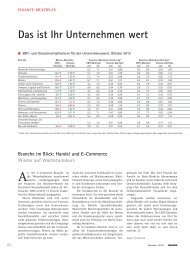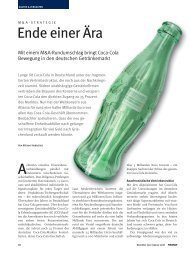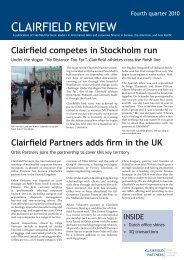April - PM: CARLTON PARTNERS A View From Berkeley - Syncap
April - PM: CARLTON PARTNERS A View From Berkeley - Syncap
April - PM: CARLTON PARTNERS A View From Berkeley - Syncap
Create successful ePaper yourself
Turn your PDF publications into a flip-book with our unique Google optimized e-Paper software.
Andrew Taee<br />
Group Chief Executive<br />
As winter turns to spring we feel it is timely to launch<br />
our view of the world from <strong>Berkeley</strong> Square.<br />
It has recently been quite dramatic – gale force<br />
winds threatened to uproot tall trees, then a blanket<br />
of snow appeared just when shrubs were beginning to<br />
blossom. <strong>Berkeley</strong> Square buzzes with people meeting<br />
and across our three Carlton Partner businesses it feels<br />
as though this is going to be an excellent year with some<br />
surprising events to unfold.<br />
“A <strong>View</strong> from <strong>Berkeley</strong> Square” has been launched by<br />
us to give you an insight into the workings of our fi rm and<br />
the specialist value-added services that we provide. We<br />
feature in these pages some examples of these values<br />
at work at Carlton.<br />
Carlton Capital Partners, Carlton’s asset management<br />
business, has enjoyed a successful year, outperforming<br />
Alice Bordini<br />
Partner<br />
A <strong>View</strong> <strong>From</strong> <strong>Berkeley</strong> Square<br />
Investment Perspectives for 2007<br />
One of the most common ways of starting a fi rst<br />
investment letter has always been “what a<br />
difference a year can make”. Well, in my view,<br />
2006 was not a life changing year. With a few exceptions,<br />
I would say it was a case of ‘more of the same’.<br />
On the economic front, the bears have been proven<br />
wrong. Growth continued unabated (despite a severe<br />
US housing downturn), no major market crashed, no<br />
major fi nancial accidents happened and there were<br />
no signifi cant corporate or fi nancial company defaults.<br />
As a pretty much constant feature in any year, we had<br />
Carlton Capital Partners<br />
<strong>April</strong> 2007<br />
its key benchmarks. Alice Bordini shares with us her current<br />
perspective for 2007 with her ideas on which alternative<br />
asset investment strategies are more likely to succeed<br />
in 2007.<br />
Carlton Corporate Finance has seen a succession of<br />
high profi le cross-border transactions working with<br />
Carlton’s international partner fi rms around the world;<br />
we highlight some of these. Also, Carlton’s new advisory<br />
board chairman, Sir Ralph Robins, shares his experience<br />
of the importance of corporate fi nance at Rolls-Royce.<br />
Carlton is in the process of putting a more formal private<br />
equity structure around our existing principal investment<br />
activities with the formation of Carlton Growth Capital.<br />
The team which we are putting together has extensive<br />
expertise in structuring and investing in companies<br />
in the smaller end of the mid-market. This is where we<br />
see opportunities to invest amounts of £2m to £12m in<br />
companies which have established businesses in growth<br />
sectors (larger transactions will be considered with our<br />
investment partners). I look forward to reporting on our<br />
progress this year as we convert investment opportunity<br />
ideas originated by Carlton’s network of people into a<br />
private equity investment portfolio.<br />
Carlton’s membership of the Clairfi eld Partnership<br />
provides us with the ability to service our clients’ needs<br />
on a global basis. We are expanding our reach into<br />
China and look forward to announcing these new<br />
arrangements shortly.<br />
a painful correction in May/June but it was already<br />
forgotten by the end of the summer. Amaranth, a<br />
$9bn hedge fund, collapsed in August and wiped<br />
out $6bn of investors’ money, or 65% of their assets.<br />
Markets barely blinked. When LTCM, a $4.5bn fund<br />
collapsed in (again) August 1998 the Fed was forced to<br />
pool the world’s major investment banks in a concerted<br />
effort to avert fi nancial crisis. True, markets were far less<br />
sophisticated than they are now and LTCM put at stake<br />
not only its investors’ money but the whole fi nancial<br />
system, hence the need for a rescue operation. In barely<br />
eight years, markets and their participants have grown<br />
and liquidity has increased dramatically. The market’s<br />
ability to absorb shocks is now far greater and makes<br />
the 90s look like the past generation. The next ten years<br />
are likely to witness another similar surge in innovation<br />
and development of the fi nancial systems.<br />
Most corporate balance sheets are very healthy:<br />
companies have used cash to reduce their leverage and<br />
fi nance acquisitions. On the other side, private equity<br />
transactions and MBOs have been largely fi nanced<br />
through debt, which has created additional leverage<br />
in the system. Credit spreads are still very low and, as<br />
soon as there is a change in the world’s risk appetite or<br />
economic conditions, they will widen considerably. The<br />
credit binge is not set to continue forever and at some<br />
point there may well be a re-rating of many fi nancial<br />
assets.<br />
www.carltonpartnersllp.com Tel: +44 207 355 2211 Fax: +44 207 495 8675
One controversial issue is volatility. Over the last few<br />
years it has, by and large, fallen in most asset classes.<br />
I believe that volatility has structurally come down in<br />
the wake of more stable economic growth around the<br />
world, better company balance sheets, an increased<br />
sophistication of the world’s fi nancial systems, a better<br />
redistribution of risk (thanks to structured fi nance) and<br />
more transparent and predictable monetary policy. The<br />
world’s central banks have gradually become reactive<br />
and markets can now mostly anticipate what the next<br />
move will be. They have traded their pro-activeness<br />
for more stable interest rates and Forex markets, which<br />
have helped equity & credit markets and economic<br />
growth to stabilize.<br />
We cannot ignore the impact that hedge funds have<br />
had on volatility. Hedge fund activity has improved<br />
market effi ciency and reduced asset mispricing. This<br />
said, volatility price is in most markets undervalued and,<br />
although the timing for a volatility re-rating is very hard<br />
to predict, the downside is much lower than the upside.<br />
This applies more in markets whose economies could<br />
slow down more markedly in 2007 and could therefore<br />
make volatility surge.<br />
Equity markets are not cheap. In most cases they are fairly<br />
valued, but in a few they are outright expensive (e.g.<br />
India). If corporate earnings slow, markets would have<br />
to change their assumptions and some selling pressure<br />
would emerge. On the other side, should growth come<br />
in better than expected, infl ationary pressures are likely<br />
to grow stronger and central banks would be forced to<br />
raise rates, which would have a potentially even bigger<br />
negative impact on the market.<br />
Overall I expect market corrections during 2007, but see<br />
positive numbers by year end. Private equity activity,<br />
share buybacks and M&A are set to continue at a<br />
strong pace and drain funds, and hence liquidity, out<br />
of global markets. The emergence of a new investor<br />
base in developing countries has created additional<br />
demand for fi nancial assets, which will create further<br />
impetus to their prices.<br />
Liquidity remains high, despite the substantial reduction<br />
from the levels two years ago. Banks continue to<br />
Introduction<br />
Rank value<br />
$150,000<br />
$125,000<br />
$100,000<br />
$75,000<br />
$50,000<br />
$25,000<br />
A <strong>View</strong> <strong>From</strong> <strong>Berkeley</strong> Square<br />
M&A Buyside Financial Sponsor Activity (US$m)<br />
source: Thompson Financial<br />
M&A Buyside Financial Sponsor Activity (US$m)<br />
$0<br />
2000 2001 2002 2003 2004 2005 2006<br />
Rank value (US$m) # of deals<br />
800<br />
700<br />
600<br />
500<br />
400<br />
300<br />
200<br />
100<br />
0<br />
# of deals<br />
multiply it and feed it into the system. The fall in oil<br />
prices has also had a positive impact. Commodities<br />
have emerged from 20 years of bear markets and<br />
have benefi ted from increased demand, momentum<br />
investing and their consecration as an alternative asset<br />
class, followed by a surge in the amount of capital<br />
global investors allocated to them.<br />
The question now is: “Where do we go from here?“<br />
We are asset allocators and the questions we ask<br />
ourselves are where to allocate capital, what might<br />
be the best vehicles to play our top down views and<br />
whether we can do so in a controlled risk framework.<br />
We invest most of our clients’ capital in alternative<br />
funds, mostly hedge funds, and are not benchmark<br />
driven. Investing in hedge funds means that we have<br />
access to a huge variety of investment opportunities<br />
across all instruments, asset classes and geographies.<br />
It means identifying a market’s potential (beta) as well<br />
as a unique way of playing that market (a portfolio<br />
manager’s skill and talent, the alpha).<br />
What do we like?<br />
Equity, in particular emerging markets. The story is just not<br />
comparable to anything else in the developed world.<br />
Let us just consider that in 1950 developed economies<br />
accounted for 60% of the world economy. Today they<br />
are about 50% and getting smaller every year. $3bn of<br />
new consumers and producers have been added to<br />
the global system. It is a new middle class that is fuelling<br />
the system and making the world less dependant on<br />
the US consumer. Emerging countries, and not only<br />
the so-called BRICs (Brazil, Russia, India and China),<br />
are set to overtake developed economies soon with<br />
clear implications in terms of demand for commodities<br />
(metals, precious and soft, and agricultural produce)<br />
and for developed market exports.<br />
Asia is a fertile ground for a number of hedge fund<br />
strategies because it is still ineffi ciently priced, especially<br />
compared to developed markets, and is in continuous<br />
change. Even with a correction factored in for the year<br />
I am very bullish. China is likely to have another positive<br />
year with most of the buying in the market being<br />
domestic. I also like Japan. It is trading at low historical<br />
valuations, with a P/E of 18x versus an average of 35x<br />
since 1988 and an EV/EBITDA of 7.7x versus 8.2x for the<br />
US, which signals its signifi cant de-leveraging in recent<br />
years (data for MSCI Indices). Sentiment is still negative<br />
but the country is slowly coming out of defl ation, which<br />
means that Japanese investors will have to make<br />
substantial changes to their asset allocation. Last year<br />
M&A activity also started in a convincing way with the<br />
fi rst ever domestic hostile bid and more cross-border<br />
deals.<br />
I like Latin America, especially Brazil. The increasing world<br />
demand for food and bio-energy will benefi t this country<br />
which has seen its interest rate come down in a straight<br />
line in 2006 from 18% to below 13%. With infl ation running<br />
at around 3%, the potential for further reduction is large.<br />
This is coupled with the modernisation of its economic<br />
and credit system, and with a developing middle class<br />
the potential for growth is there.<br />
www.carltonpartnersllp.com Tel: +44 207 355 2211 Fax: +44 207 495 8675
Selected Eastern European markets, in particular the<br />
most peripheral ones, are set to benefi t hugely from<br />
their countries’ accession to the EU. Their equity markets<br />
are still underdeveloped and under-owned by foreign<br />
investors, which is exactly what we look for.<br />
Western Europe is benefi ting hugely from Eastern<br />
and Central European countries’ convergence. Two<br />
examples are the swollen order book of German<br />
construction companies and the booming fi nancial<br />
sector. Not all of this is in equity market prices yet.<br />
Activist strategies should continue to perform strongly.<br />
The world is unmistakably going towards fi nancial and<br />
economic effi ciency and anyone trying to resist it is<br />
bound to struggle. Emerging markets are also becoming<br />
an interesting ground for this strategy, especially in Brazil<br />
and Asia.<br />
Gideon Franklin<br />
Senior Advisor<br />
A <strong>View</strong> <strong>From</strong> <strong>Berkeley</strong> Square<br />
The M & A Markets<br />
The combination of cheap money and corporate<br />
confi dence, which lead to 2006 breaking records<br />
for M&A, has continued in 2007. Activity levels<br />
are still high, albeit that some of the most compelling<br />
deals have been undertaken and chief executives are<br />
maintaining a highly disciplined and strategic approach<br />
to M&A. The price expectations of some vendors are<br />
also inhibiting transactions.<br />
Financial sponsors seek ever larger investment<br />
opportunities, as demonstrated by the potential offers<br />
for Sainsbury’s and Boots and the offer for TXU in the<br />
USA.<br />
Sponsors are also continuing to compete strongly in the<br />
auction processes in which we have been involved.<br />
Recent transactions have seen fi nancial buyers winning<br />
the day with offers approaching 10x EBITDA. However,<br />
the re-rating of many corporates and their ability and<br />
willingness to debt fund deals is enabling them to<br />
compete, albeit by sharing the value of achievable<br />
synergies.<br />
Financials and real estate extended their lead in M&A in<br />
the so-called mid-market (under $500m value) last year,<br />
whilst industrials, materials and energy overtook tech<br />
Finally, I do not like credit spreads at these levels, and<br />
am concerned about the huge leverage that has been<br />
created in recent years by structured products.<br />
Conclusion<br />
Carlton Corporate Finance<br />
To conclude, I believe 2007 will be an eventful year,<br />
where a number of real and fi nancial assets are<br />
likely to converge towards their fair price. Important<br />
developments are likely to happen on the political,<br />
economic, social and fi nancial sides. Investing will be<br />
less easy than the past three years and differentiation<br />
will be a must. We are constantly on the look out for<br />
new trends and infl exion points, and smart and different<br />
ways of playing our views. �����������������<br />
�������������������������������������������������<br />
�������������<br />
���������������������<br />
��������������������� ���� ��������� ��������������������� ���� ���������<br />
������ �����������������<br />
������������������ ����� �����<br />
����������������� ����� �����<br />
���������� ��������� ���� ����� �������� ���� �����<br />
����������� ��������� ���� ����� �������� ���� �����<br />
����������� �������� ��� ����� �������� ��� �����<br />
���������������� �������� ��� ����� �������� ���� �����<br />
��������� �������� ��� ����� �������� ��� �����<br />
���� ���������� �������� ��� ����� �������� ���� �����<br />
����������������������� �������� ��� ����� �������� ��� �����<br />
������������������������������ �������� ��� ����� �������� ��� �����<br />
���������� �������� ��� ����� �������� ��� �����<br />
���������������� �������� ��� ����� �������� ��� �����<br />
������ �������� ��� ����� �������� ��� �����<br />
������������������ �������� ��� ��� �������� ��� ���<br />
����������������������� ����� �� �� ����� �� ��<br />
�������������� ��������� ����� ������ ��������� ����� ������<br />
�������������������������<br />
��������<br />
��������<br />
��������<br />
�������<br />
�������<br />
�������<br />
�������<br />
��<br />
����������<br />
Mid-Market M&A by Target Industry Up to US$500m<br />
�����������<br />
�����������<br />
and media. Deals in telecommunications ������� ���������������������������������������������������������<br />
once more<br />
rank at the bottom end of the group.<br />
Transactions<br />
����������������<br />
�����������������������������������������������<br />
���������<br />
���� ����������<br />
�����������������������<br />
������������������������������<br />
Carlton and Clairfi eld Partners advised on transactions<br />
approaching $1bn in value in 2006 and we continue to<br />
build on this into 2007.<br />
2006 transactions included advising:<br />
AXA Private Equity on the acquisition of Pfl eiderer Track<br />
Systems, a leading player in the rail track industry with<br />
seven plants in Germany, Hungary, Romania and Spain,<br />
for $180m.<br />
Rentokil Initial Plc on the acquisition of J.C. Ehrlich<br />
Co. Inc., a pest control service based in Reading,<br />
Pennsylvania, for $142m.<br />
McCormick & Company, Inc. on the acquisition<br />
of the assets of Epicurean International, a leading<br />
manufacturer of Asian food products under Thai Kitchen<br />
and Simply Asia brands, for $97m in cash. McCormick<br />
is a global leader in the manufacture, marketing and<br />
distribution of spices.<br />
����������<br />
����������������<br />
������������������������<br />
������������������������<br />
������<br />
������������������<br />
�����������������������<br />
�������������������������<br />
www.carltonpartnersllp.com Tel: +44 207 355 2211 Fax: +44 207 495 8675
A <strong>View</strong> <strong>From</strong> <strong>Berkeley</strong> Square<br />
Philips Electronics N.V., Europe’s largest electronics<br />
company, on the disposal of Anteryon International B.V.<br />
to the Cosyma investment group. Anteryon develops,<br />
manufactures and markets a range of optical<br />
technology products.<br />
Transactions in 2007 to date include advising:<br />
Spectris Plc on the disposal of Spectrum Inspection<br />
Systems, manufacturer of contaminant detection<br />
equipment for the food, pharmaceutical and textile<br />
industries, to Illinois Tools Works Inc.<br />
McInerney Homes Plc, the leading Irish housebuilder, on<br />
the acquisition of Lancing Homes, based in the North of<br />
England.<br />
Coveright and its private equity shareholders on the<br />
disposal of the furniture division to Spanish Group<br />
Pozorica SC.<br />
GB Group, the largest manufacturer of spare parts for<br />
the agricultural and heavy machine industries, on the<br />
acquisition of Tractiv Group from Close Brothers Private<br />
Equity.<br />
Morel Nettoyage, the French cleaning services<br />
company, on its sale to ISS.<br />
Japack, a distributor of food processing and packaging<br />
machinery, on the sale of the company to OFI Private<br />
Equity and the management.<br />
Welcome to Sir Ralph Robins<br />
Sir Ralph Robins has recently joined Carlton as<br />
Chairman of the Advisory Board. His CV is remarkably<br />
simple – just one company, Rolls-Royce, for the last 50<br />
years as Managing Director, Chief Executive and then<br />
Chairman. “I planned to leave after two years, but kept<br />
on being promoted. Perhaps the most remarkable thing<br />
looking back is how Rolls-Royce came to dominate the<br />
large aero engine market with GE. Twenty years ago it<br />
powered just fi ve aircraft; now every commercial aircraft<br />
in the world except the 737 is powered by Rolls-Royce”.<br />
He was also a director of several other international<br />
companies. His achievements and experiences during<br />
this period will be invaluable for us at Carlton and our<br />
clients.<br />
M&A played an important role in the development of<br />
Rolls-Royce including establishing a presence in marine<br />
with Vickers and a large US presence with Allison from<br />
the private equity fi rm Clayton. “Rolls-Royce bought<br />
Allison after three attempts to prise it out of GM. A surprise<br />
success of that acquisition turned out to be engines for<br />
the Brazilian short haul aircraft manufacturer Embraer”.<br />
Carlton Corporate Finance Ltd<br />
Jane Hughes - Managing Director<br />
Simon Murphy - Managing Director<br />
Mark Harrison - Managing Director<br />
Albert Ganyushin - Managing Director<br />
Scott Young - Managing Director<br />
Carlton Capital Partners LLP<br />
Sir Ralph Robins at the Carlton Reception<br />
People sometimes wonder if Carlton is connected<br />
with other companies bearing the same name. The<br />
Rolls-Royce name is familiar through cars as well as<br />
aerospace. Although the car business was sold in<br />
1973, “it never mattered people confusing the two<br />
companies providing the quality of the car remained<br />
high” he said.<br />
Sir Ralph is also Chairman of The Alter Technology<br />
Group, a company which acquires, tests and supplies<br />
components for the space and defence industry. “You<br />
can have a $100m product which depends on a $5<br />
piece of silicon to function reliably.”<br />
Carlton Corporate Finance Activities<br />
Carlton Corporate Finance provides strategic fi nancial<br />
advice, identifi cation of potential buyers and sellers,<br />
valuation and the management of transactions<br />
including private and public acquisitions and disposals,<br />
Rule 3 Advisory, capital raising and restructuring.<br />
Our extensive network at senior level in corporations<br />
and fi nancial institutions allows us to originate, negotiate<br />
and complete transactions in a discreet, effective and<br />
highly disciplined manner on behalf of our clients.<br />
The Clairfi eld Partnership provides our clients with access<br />
into key global markets. It also means that we maintain<br />
strong local knowledge of the regulatory, fi nancial and<br />
market issues that often makes the difference in closing<br />
a complex transaction.<br />
Eric Schots - Founding Partner<br />
Alice Bordini - Partner<br />
Nick Jones - Head of Sales<br />
Ariane Payen - Executive Director<br />
Carlton Growth Capital LLP<br />
Kevin McCollum - Partner<br />
Stephen Willis - Partner<br />
Alan Wheatley - Partner<br />
www.carltonpartnersllp.com Tel: +44 207 355 2211 Fax: +44 207 495 8675


